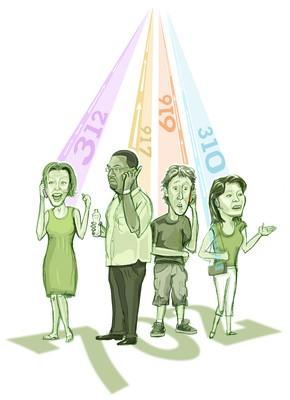Code-Carrying

Recently, University of Nevada, Las Vegas professor Sajjad Ahmad wanted to tell his teaching assistant that she left her keys and books on his desk.
He had to dial Hawaii.
“And she was within probably 200 meters of my office,” Ahmad said.
Many of the approximately 6,000 new residents Las Vegas receives each month are holding onto their hometown cell phone numbers.
“People just aren’t changing their number just because they move anymore,” said Joe Farren, spokesman for the Washington, D.C.-based CTIA wireless association. “And why should they want to?”
“I’ve had this number for 18 years,” said 310 code-carrier Gary Davies, who relocated from Los Angeles in 2004. “So changing it would take a lot of effort — to contact everybody who knows me or just happens to have my number … long-lost friends.”
“Why should I make anyone have to get out their cell phone and change my phone number in it?” added Joey Tempesta, weekend DJ at KMXB-FM, 94.1 and a 617 code-carrier.
AT&T Wireless cleared the brush for code-carrying in 1998, by offering the first calling plan that eliminated roaming and long-distance charges, which once made out-of-area cellular calls expensive. Other carriers followed and, by 2003, virtually no plan charged extra to operate a cell phone outside its area code.
None of the major wireless companies would reveal how many of their customers have switched cities and not cell numbers in recent years. (A Verizon Wireless spokeman called the information “proprietary.”) However, the phenomenon has become undeniable.
“It’s definitely something that’s happening more and more,” said Sprint spokeswoman Debra Havins. “And because you see so many people moving to the Las Vegas area, it’s something that will stand out more.”
Although convenience is the most common reason cited, many of the code-carriers we interviewed said it’s also better for business.
“All my contacts are still in Sonoma and Napa (in California),” said Dustin Valette, executive chef for Henderson’s soon-to-open Vox Restaurant and Wine Lounge.
Valette has resided in 702 since February. But his Samsung i730 still reads 707.
“This way, Gary, a small organic farmer from Healdsburg, California, has the ability to call me on a local number to send me almond samples,” he explained.
To Davies, who owns a documentary film company, remaining a 310 is the equivalent to driving a BMW.
“Being in the entertainment business, it (provides) a little more cachet,” he said.
Many code-carriers also said they enjoy the public display of hometown affection it allows.
“They won’t let me keep my license plate,” said night life marketing consultant and die-hard 917 carrier Andrew Wintner. “My cell number is the one thing that I get to keep, and I want to keep a little of New York with me.”
“I’m the obnoxious kid with the Red Sox sticker on the back of my car,” echoed Tempesta. “It’s not that I don’t love Vegas. I do.
“But I’ve got to keep it real.”
Code-carrying is not without its drawbacks. For instance, valley residents without cell phones may not return your messages.
“It used to bug the liver out of me,” said UNLV professor Kathy Bell, who is besieged by requests to dial New York, Massachusetts and Ohio whenever she checks her office voice mail.
UNLV issued Bell a PIN code to dial long distance from her office phone. However, Bell explained, “that croaked a couple of years ago and it’s too much of a pain to go find a new PIN number.”
Code-carrying may also attach social stigma, making 702-refusers seem noncommittal, or even snobby. Las Vegas bookkeeper and proud 312 holder Deanna Schaffino recalls raising a 702 eyebrow while recently buying furniture.
“They asked, ‘How long have you lived here?’ ” the Chicago native remembered. “I told them two years. So they said, ‘And you still have a 312 number?’ “
There’s also the inconvenience of dialing three extra numbers to make a doctor’s appointment or order a pizza (four, if you count the “1”).
But code-carriers view these disadvantages as negligible.
“In Boston, where I come from, you have to dial a 10-digit number regardless,” said Tempesta, “even if you’re in the area code you’re calling. It’s not much of an inconvenience. I got used to it back in the late ’90s.”
“Would you really change your number for those reasons?” Farren asked. “Most people probably wouldn’t.”
Even Bell realized the losing nature of her battle. Now she dials all her 10-digit students from home.
“We went out and got free long-distance service, just for that,” she said.